When you are homesteading in your backyard in the suburbs or even in a small town, there is only one thing as important as egg quality when deciding what breed of chickens to raise – how much noise they make.
Quiet chicken breeds do exist, and you do not have to sacrifice egg quality to raise them!
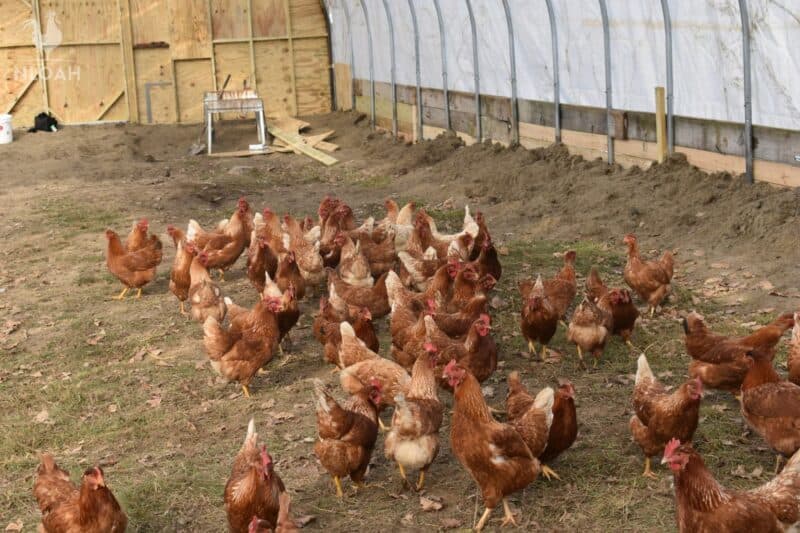
If you do not want angry neighbors pounding on your door or stopping you in the driveway over the constant chatter of your beloved flock, invest in a breed known for its polite demeanor.
Roosters are generally the biggest noise makers in the barnyard. My top rooster, who I affectionately refer to as “Flock Leader” doesn’t have a single quiet bone – and some friends and family say not a nice bone, in his entire body.
If my misunderstood rooster suddenly disappeared, the entire flock would roam about the barnyard and you wouldn’t even know they were there.
If you’re interested in raising a backyard flock of chickens that doesn’t raise a ton of noise, here are some of the quietest chicken breeds.
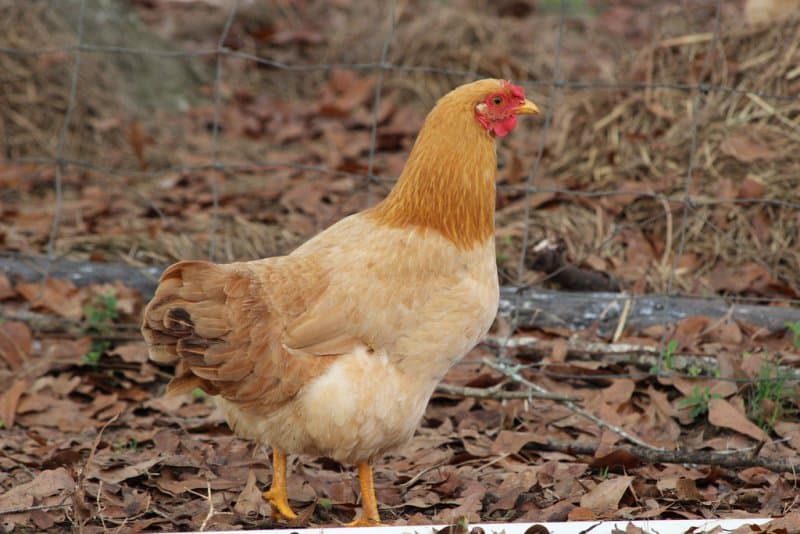
1. Buff Orpington
These beauties make both great meat birds and egg layers. They are calm, friendly enough to be considered a true pet, are easy to handle, and best of all…incredibly quiet – like church mouse variety quiet.
It is not uncommon for Buff Orpington chickens to wander over to you, squat down in a submissive manner, and wait to be picked up and loved upon.
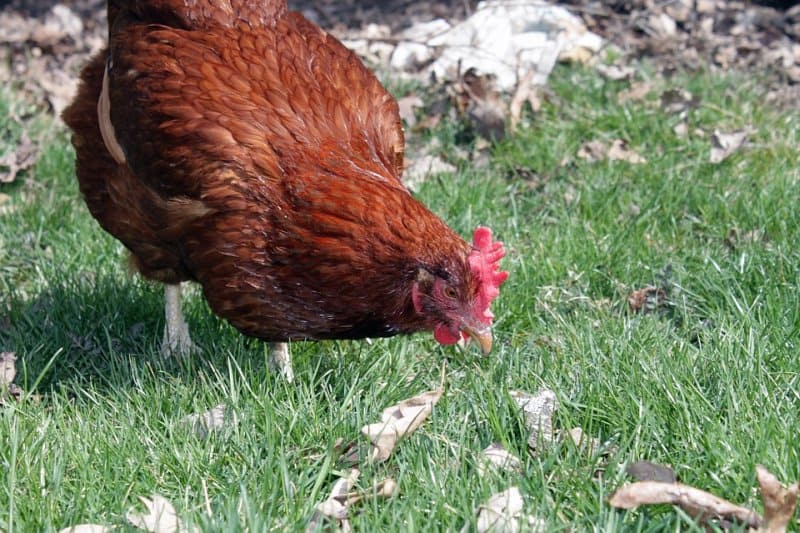
2. Rhode Island Reds
This barnyard stalwart breed lays large brown eggs and is quiet and docile as well. While they are not prone to wanting to cuddle like a Buff Orpington, they are easily trained and get along well with other breeds of chickens, ducks, and guineas – which are decidedly NOT quiet birds – at all.
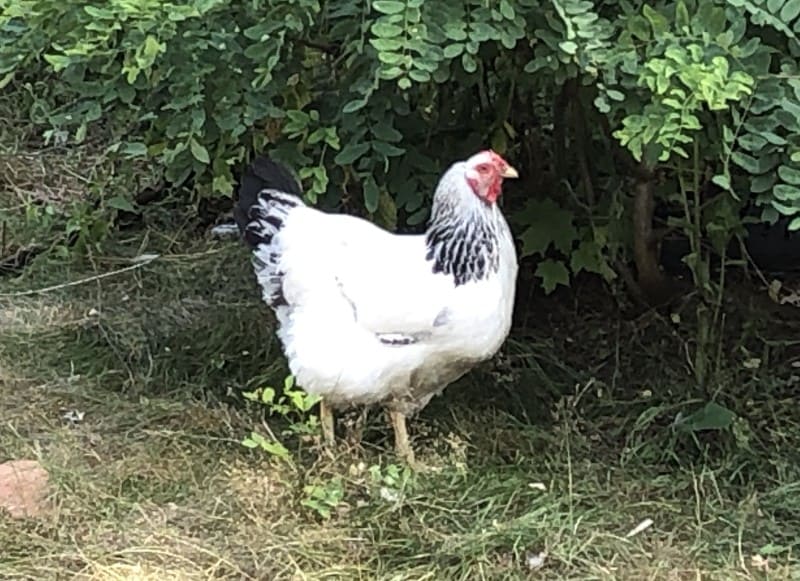
3. Wyandottes
This chicken breed is among the most common for suburban backyard homesteaders. They are hardy, affable in nature, and are dependable layers nearly year around.
Wyandottes come in a vast array of vibrant colors, including golden, blue, and silver. White Wyandottes are incredibly rare and bring a premium price from breeders.
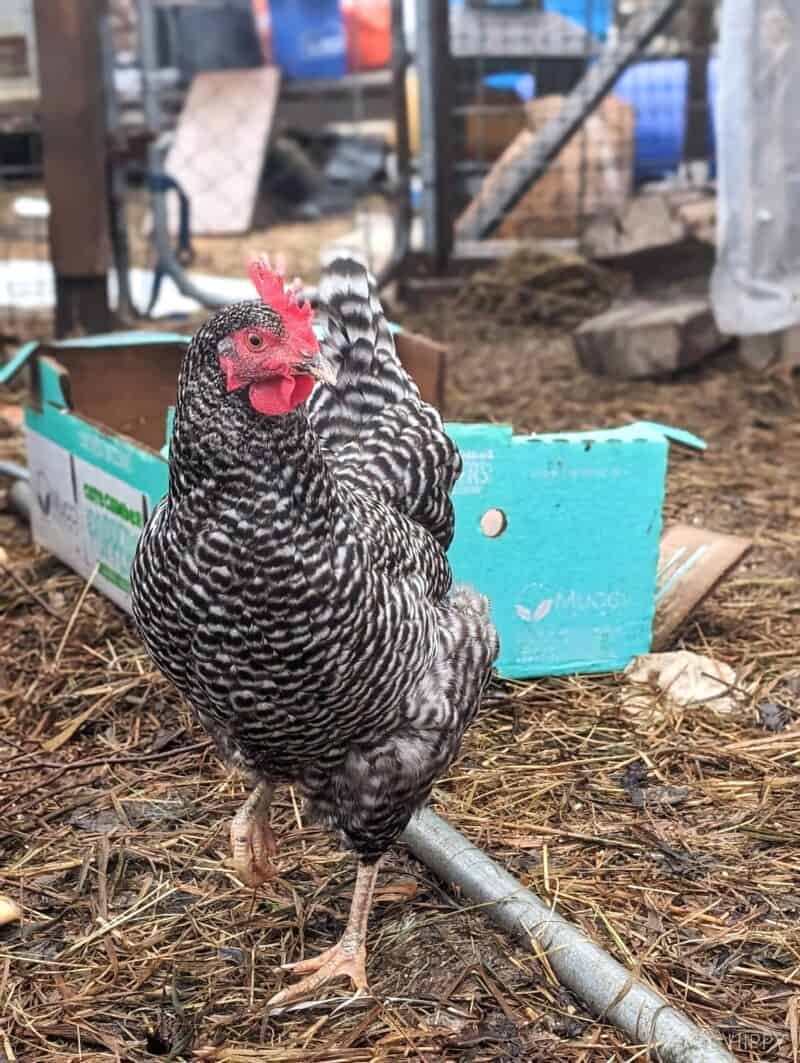
4. Barred Plymouth Rock
These quiet chickens lay large brown eggs and are a favorite of farmers and homesteaders who live on a small to moderate amount of acreage.
Although they are quiet, they are a very outgoing and friendly chicken breed and will enjoy interacting with their human caretakers. Barred Rock Plymouth chickens are exceptionally cold climate hardy.
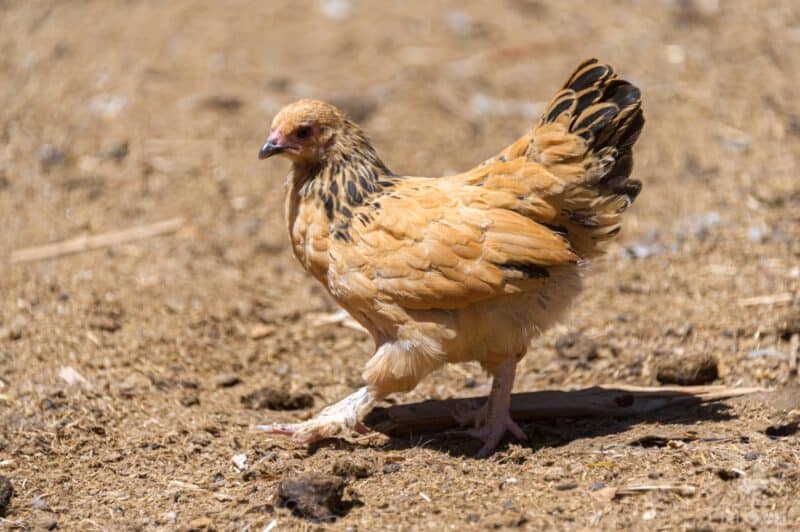
5. Bantam
These little chickens also come in an array of attractive dark colors and are dependable egg layers. “Banties” lay a smaller white egg that tastes yummy, but are most often kept because of their exceptional maternal instincts.
Bantams are excellent sitters and are frequently used as surrogate moms for Rhode Island Reds, who are poor sitters.
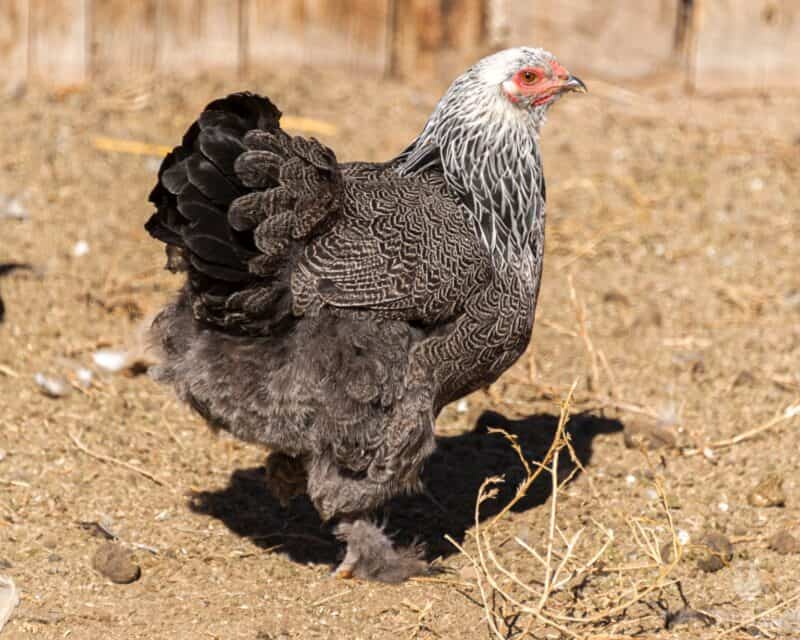
6. Brahma
This breed is often referred to as the “King of Poultry” due to their massive size. They are a heritage breed of chickens boasting hens that can grow to hit weights of up to 14 pounds.
Brahma roosters have been known to weigh a little over 18 pounds. The average weight for a Brahma hen is around 10 pounds. They are an amazingly hardy breed and are dependable white egg layers.
Brahmas are heralded the best winter layers and are even known best from October through May.
Brahma hens are also quality sitters, but due to their bulk chicks can get trampled and squished during their first few days of life if left in the nest.
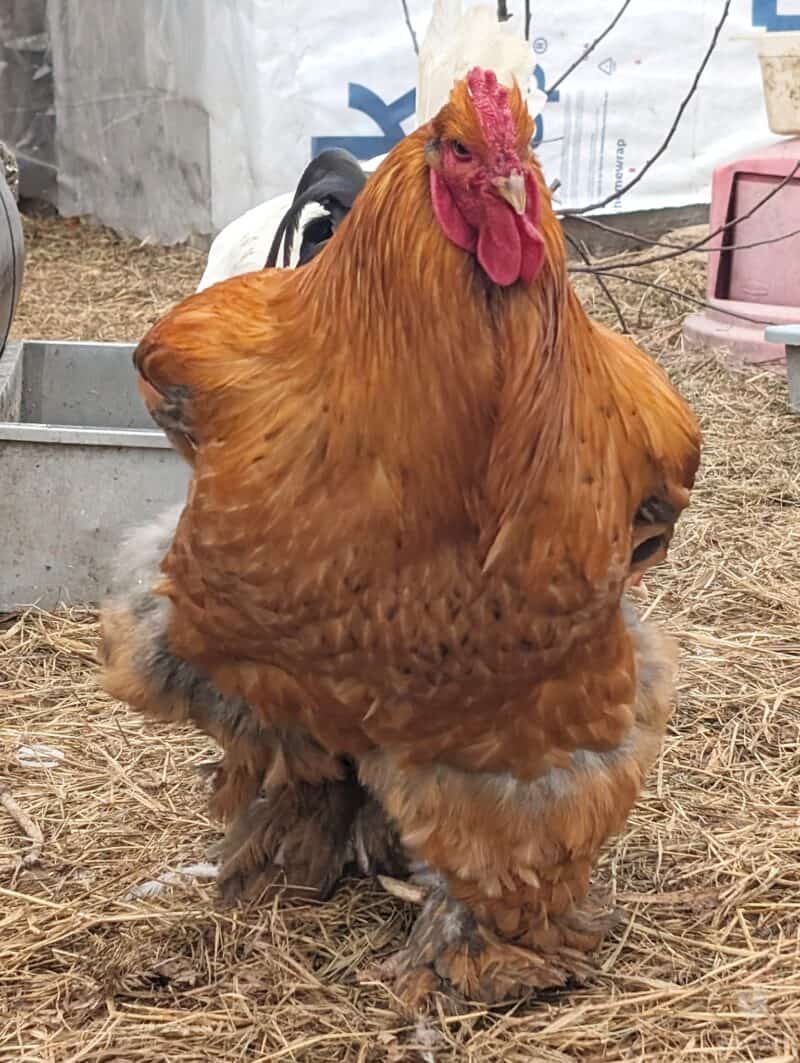
7. Cochin
These large and quiet birds are also a heritage breed. The massive puffy balls of feathers are absolutely lovable, so much in fact, the Queen of England once kept them as pets.
While they are quiet and adorable, they are only mediocre layers. But, what Cochin hens lack in laying ability, they make up for with their maternal skills and make superb surrogate moms for the eggs of the coop gal pals.
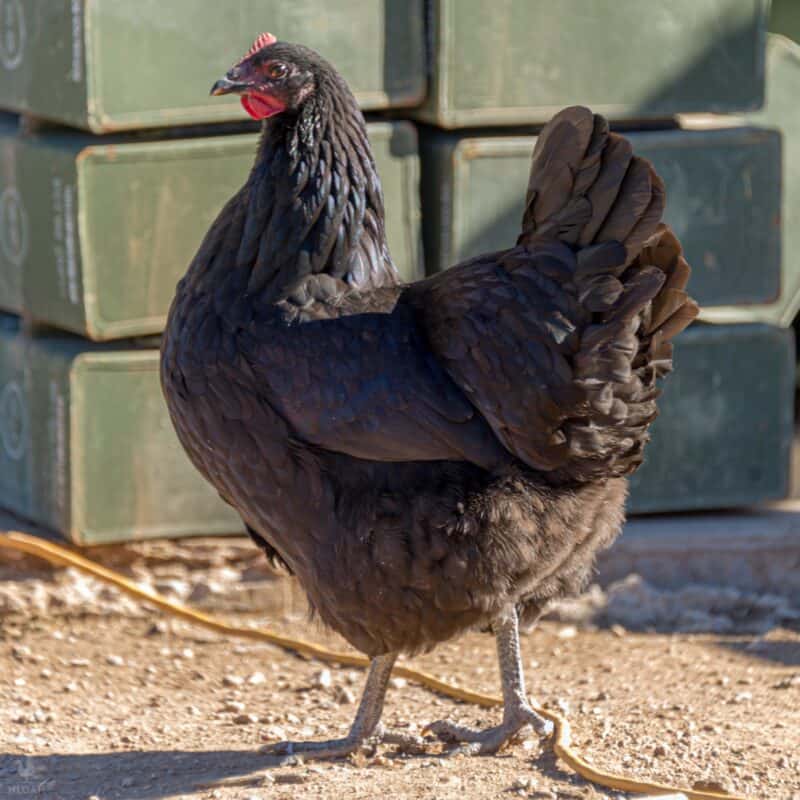
8. Australorp
This breed is the utility player of the chicken world. They are both quality layers and sitters. During the 1920s Austrlorp hens broke world egg laying records.
They lay medium-sized brown eggs. The Australorp hens are also highly regarded for their peaceful, calm, and yes – very quiet, personalities.
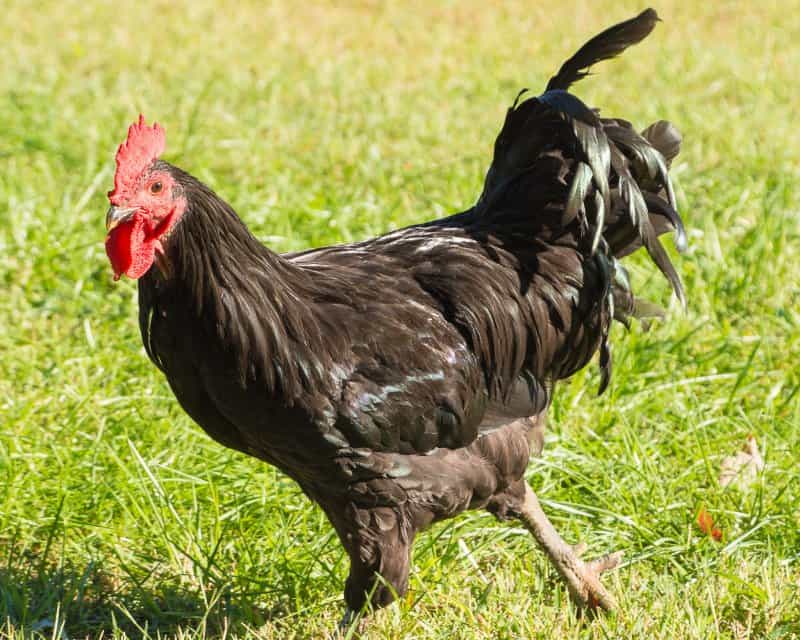
9. Java
This heritage chicken breed is generally recognized as the second-oldest established breed on the planet. They are a dual purpose meat and egg bird. Java hens are dependable layers and at least average sitters.
This endangered breed was widely used in the establishment of many American breeds of chickens, like the Rhode Island Red and Barred Rock Plymouth.
Java hens boast a rather dignified and quiet personality and tend to do best in small flock environments.
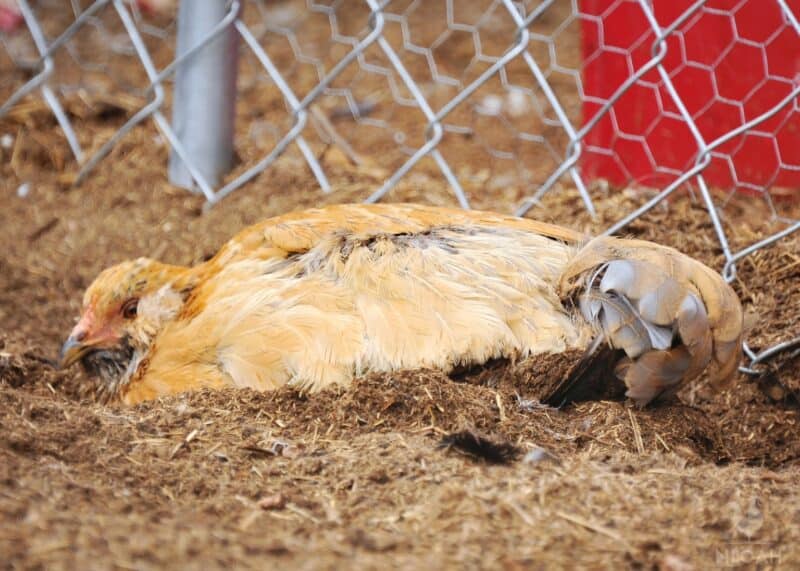
10. Ameraucana
The oddly attractive breed lays medium-sized light blue eggs. They have a beard and muffs instead of ear tufts like other chicken breeds.
They are rather large birds, hens typically grow to hit a 7-pound weight. Ameraucana hens are calm, quiet, docile, and easily handled as long as they do not feel threatened.
11. Salmon Faverolles
These delightful chickens are mellow, friendly, and also very quiet. They’re even great with children! They have a sweet temperament and they love to explore their surroundings.
12. Sussex Chicken
The Sussex chicken is a gentle soul who loves people and isn’t too noisy either! They come in several varieties, including white and light Sussex, which is an especially beautiful white-feathered breed with black eyes and a pink beak.
Is There a Breed of Chicken That Doesn’t Crow?
The one sound that gets on some people’s nerves is the cock-adoodle-doo of a rooster’s crow. Roosters tend to crow at any time, day or night, much to the dismay of sometimes light-sleeping homeowners.
While it can’t be denied that roosters add charm to any farm with their loud calls, some may wonder if there is a breed of chicken that doesn’t crow.
Interestingly, the intriguing answer is yes!
Silkies and Phoenixes, two popular chicken breeds among hobbyists, produce less frequent crowing than other more common rooster breeds do.
However, it’s still advisable for those considering getting chickens for their backyard to understand that most breeds will still perform this daily wakeup call – even Silkies.
Which One Will You Choose?
Some other quiet backyard chickens include:
- Polish chicken
- Easter Egger
- Leghorn chickens
Quiet chicken breeds are also typically composed of decidedly calm and jovial hens, as well. The environment the chickens live in can also play a substantial role in how quiet or noisy they become on any given day.
Free-ranging breeds do not need “boredom busters” to keep the content, laying, and playing nice with one another.
When allowed to roam at their leisure, the birds are both physically and mentally stimulated and simply don’t feel the need to carry on and make a bunch of rackets.
A free flock is also usually a healthier flock because they are adhering to their natural instincts and selecting big juicy bugs out of your yard to feast upon – and reducing your feed bill in the process!
Noisy chickens in a run might have as much to do with the space and the environment as it does the breed. The general rule of thumb is the taller the coop and run, the happier (and quieter) the chickens will be.
Some breeds of chickens really hate to go outdoors when snow is covering the ground. If the coop is too small or too short, the chickens will get very vocal about their displeasure with their living accommodations.
If the chickens will be constantly confined to the coop and run, you should allow for at least five feet of space per bird. If your homesteading budget allows, increase the space to 10 feet per bird.
To keep the chickens focused on something other than picking at each other or themselves, makeshift some roosting area inside the run, put a dust bath on the ground, and hang a couple of swings.
I “went shopping” in my husband Bobby’s pole barn when he wasn’t home. I found all kinds of treasures!
I drug out an old tire to make the dust bath, some decrepit saw horses to make a roost, a cinder block as a play space for the growing chicks, and some thin boards I made into a swing by tying some baling twine (that stuff just has an infinite amount of uses, just like duct tape!) to make a two swings for the flock.
My chicken run playground project didn’t cost me a single dime, but did cause me to get a frown from the hubby who planned on fixing those old saw horses (he has three other sets) “one of these days.”
Even if you are planning on free-ranging your flock, having a run is still a very good idea. I have a large flock, but only a small chicken run (10X6 feet) because they free-range all day long.
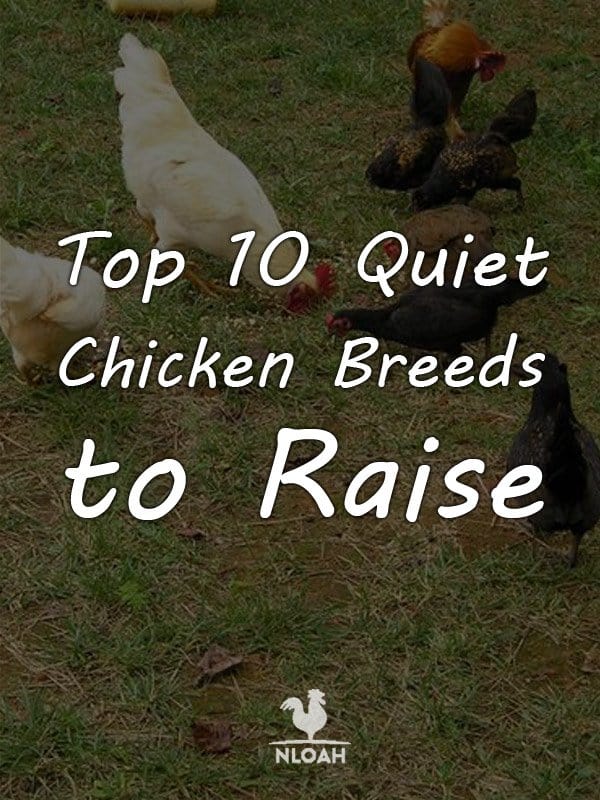

Tara lives on a 56 acres farm in the Appalachian Mountains, where she faces homesteading and farming challenges every single day, raising chickens, goats, horses, and tons of vegetables. She’s an expert in all sorts of homesteading skills such as hide tanning, doll making, tree tapping, and many more.

I have found this to be true also. I won’t do mixed breeds anymore.
I raised various somewhat mixed breeds of bantam chickens for abut 15 years while I was growing up and probably 20 out of the 50 years since. “Bantam” refers to size, not breed. There are probably as many bantam breeds as full size breeds, with all the inherent variations in personality, laying traits, brooding traits, egg shape and color, etc.
The classic slender red roosters that I had were EXTREMELY noisy. Others that were a mix of some kind of black short stocky featherlegged breed with 5 toes and flat knobby comb were much quieter(their meat, even the breast meat was charcoal gray).
I personally prefer bantam eggs, esp. free or semi-free range. I am looking for a truly quieter breed as I now have a place where I can have them. Can anyone recommend based on experience?
I forgot to mention above that just by the nature of being much smaller, bantam chickens can’t crank up the volume that a larger bird can; therefore, a bantam breed that is prone to crowing and cackling will do so just as often but with less volume.
I have three white sussex who quietly chortle from time to time but aside from that are very quiet birds.
Tara, Me too, I like what you’ve written here. I’ve been taking several years to get my coop built and to select the breeds I want. The reason I googled “quiet chicken breeds” is because I live in a fairly laid back suburb, a bedroom community really, on the California coast. Threre are several chicken owners among my neighbors, and roosters are technically allowed. You’ve made several remarks about “quiet hens” but it’s the roosters I’m concerned about. A man 2 doors down has a couple of roosters; he’s a Filipino guy and he’s culturally tuned in to fighting cocks, but as far as I know, he doesn’t fight them —but not around our neighborhood. He keeps then in a coop that has four solid walls (there are several openings, chicken-wired, like windows. I also hear roosters from someone about half a mile away from me. Anyway, I don’t just want to have hens for eggs, I want to breed them. So if you can help me on the rooster question, I’d really appreciate it. I have long decided the breeds I’d like to have, Cochins (full size, Partrige) and probably Brahmas (Light). I like the look of the Vorwerk breed, but the description says they are perky (so I read noisy). I’ll also have to have a few silkies around. And if I have room still, what with all the big big chickens, I’ll get Australorps.
Chao! Happy Holidays 2020
Oops, I meant to say roosters are NOT technically allowed here. The bottom line being whether or not any neighbors complain to the County. (we are “un-incorporated)
Hi Tara,
Great article!
Are Buckeyes hens quiet? Can they fly over a six foot fence?
I live in in the suburbs of Pittsburgh and I’m looking for
quite, winter hardy chickens that will eat bugs around my fruit trees.
Bob
We got Buffs based on this and other website’s articles, and what you have listed is not our experience. The Buff Orpingtons are antisocial, horribly noisy – squwaking in the early morning and all day – and just all around not enjoyable. A breed I would never get nor recommend to anyone, and not good worth our young kids. The Astralourps we have on the other hand are loving, quiet and more pet-like.
Buffs are amazing you’re crazy
Sometimes you don’t get pure breeds and then they can be a bit noisy and skittish, if they are pure breeds they are docile and friendly.
BW, You must’ve got a bad batch. Everywhere I read says they are one if the best breeds to own. I have one for years now and she’s the best chicken out of the 20 different breeds I have owned.
Best breed , what breed ? What is BW?
Of all my chickens, my lone buff Orpington is the noisiest and meanest of the bunch. I did my research and everyone recommended them as the best breed for suburban chicken keeping, but she squawks all day every day and is not friendly. I’m currently searching for another, truly quiet breed to add this year. My cream legbar and barred rocks are sweet and quiet, so I may just get more of those.
Thanks for sharing your knowledge and experience Tara. Encouraging to learn my Brahma cockerel shouldn’t be too noisy if I keep him happy.Best regards, Robert (London,England)
not true, Island red is quite noisy
I fully agree!
Yes! RIR’s can get terribly disgruntled and make the most annoying sound known to humans and fellow suburbanites
Brahma does not lay white eggs, big mistake.
There is no such breed as “bantam” with dark feathers. There are many bantam breeds, true as well as versions of standard breeds, many bantam breeds in fact, of different coloring.
Great idea to educate others, but please educate yourself first. It’s a common knowledge.
WRONG
Black Old English Bantam Chickens | Cackle Hatchery
https://www.cacklehatchery.com › black-old-english-game-bantam
$3.85 – Out of stock
Jan 6, 2016 – If you are interested in the miniaturized version of the Standard Old English Game chicken, the professionals at Cackle Hatchery® are here to help. … You can order Black Old English Bantam baby chicks today or give us a call if you have any questions! Many people who like this breed …
Thank You for this article. I had some Rhode Island Reds, but predators got them all, I am in the country but have neighbors. Is there such a thing as a quiet breed that is also somewhat aggressive? That will do good in climates with high heat and high humidity [like South Central Texas]
Jersey giants I have them in Florida
I’m late to this article but it was really helpful thank you. I was also happy (If that’s even the right word) to hear that other people get sad when a chicken dies. My husband and I live in city limits and everyone around us thinks we are a cute quirky oddity because of our chickens and ducks and veggie garden that takes up every bit of yard we have. Much of our time has been spent in trial and error so when a chick died we felt it was our fault for not having the correct protection. Some was ignorance and some was price and some are from very persistent raccoons. The bird net idea is definitely going to happen soon! Like yesterday! I’m rambling but thanks again for the great advice!
Nice article… But bantams are not a breed, but a size. I imagine one couldn’t generalize about how vocal certain chickens are just based on their size.
Great list! I have moved back to the city but can still have chickens. However, they have to be quiet or the HOA can make me get rid of them. When I lived in the country, I had a Barred Rock that I named Bellows because she would bellow quite loudly every time she saw me. But, my Buff Orpington and Rhode Island Red were very quiet!
Beverly, glad you liked the list! Our Rhode Islands are sweet and quiet too, even the rooster! I am going to start breeding Buckeye chickens – am from Ohio and they are a heritage breed that originated only about 40 miles away. The only chicken breed developed by a woman in the entire country! I can’t imagine living under HOA rules. When I drove 65 miles to the city for real estate classes, one instructed ended up dubbing me an Appalachian American because stories of life out here completely flipped him out: NO HOA’s in the entire country, no permit offices, no zoning, I can simply walk outside and decide to build on a room myself and even do all of the electrical and plumbing work too – only related government controls we live under, in town or out, are health department sewage mandates.
Hey. Great idea have week retreat ever so often for women who want to learn. A about homesteading I would love it and I think you would have a hit
I have had buckeyes for years and love them. They walk on your feet and are gentle and endearing. Some beeders roosters are a little much in your face macho, have been somewhat not as pleased with the roosters from some breeders. The preservation society had wonderful buckeyes. A predator got in their flock and they now have new stock. They weren’t producing enough for sales this year. Mine are from cackleberry. They are not top show form and were a little rough mannered at first but after hand feeding each evening they have mellowed out very well. Love them.
Hi, i want to know if Barred Plymouth Rock roosters are quiet generall?
Tara- great job. I have an Urban Homestead on the east coast. I have been wanting few chickens, but the county where I live doesn’t allow them unless you are on over an acre. So the knowledge of quiet chickens helps us urban homesteaders a lot.
Keep up the great work.
Hey Rook, thank you. Hate to hear you are forced to live under such stringent rules. California is a right to farm state, sometimes counties and municipalities infringe upon those rights. Maybe reviewing your state’s right to farm guidelines and requirements and the local related codes could alert you to any possible violations and/or help you to inspire other urban farmers in forming a group that could lobby local lawmakers to change existing minimum land requirements, even on a temporary and pilot program basis. Such approaches have worked in other places. Good luck to you!
This was a wonderful article, thank you for taking the time to post it. I will be starting a small flock this spring and the information about the coop and run will be extremely helpful. This article will be helpful to my daughter who is also getting more chickens in the spring.
Good morning Donna, always thrilled to hear not just about more farming gals, but those who are training up the next generation too! Getting the coop and run right is the most important part of keeping a flock – so many of us found out how to create a poultry version of Fort Knox via trial and error, with heartbreaking bird loss included. I would highly recommended getting guineas too – and they as so NOT quiet, but will protect your flock whether your free range or not. They are tenacious little critters and provide hours of free entertainment watching them run around the barn yard on watch patrol. When you and your daughter get your chicks, cut a grape in several small pieces and toss one into the brooder, it is absolutely hilarious, they treat it like a football and will chase and steal it back and forth until one hardy chick stops running long enough to eat it. Please share how your flock experience goes in the spring, and never hesitate to stop back by for advice!
Tara, thank you for this highly informative article. My question may seem silly but do any of these breeds feature quiet roosters? Right now I’m leaning toward Buff Orpingtons as I want friendly birds and their coloration will help them to blend in to our desert landscape when they run in the fenced yard. But I’d really like to have a rooster for a sustainable flock. My plan is to start with a small 4-6 bird flock and possibly expand to 10.
Ray, no such thing as a silly question, especially not when you are among homesteading friends! In my experience, Rhode Island Red and White California Sex Link rooster are the quietest. Now, my top rooster, I call him Flock Leader but everyone else has dubbed him with some rather unkind labels my mother wouldn’t like me to repeat, is a Leghorn. He is not quiet, but not really noisy, and I think he is half-guinea – at least in character. My flocks of chickens, ducks, and guineas all free range together during the day, Flock Leader keeps everyone well within the established barn yard boundaries and only makes loud noise when someone briefly neglects to follow his commands or possible danger is near. The trade off between noise and his protective skills, is worth it for me. My barn is probably 250 yards from the house, I can hear him, but not in any way that is really annoying. When I hear Flock Leader getting wound up, I know to go peek out and make sure everything is alright. The only real downside to Leghorn roosters is they can be aggressive, being a former foe of chickens after a painful childhood encounter, I was very concerned about having Leghorns because of this. But since the 3 we have were a gift from our daughter, I decided to give it a try. Worst that would happen is one bad incident and then they all go right into the cook pot. Ironically, I found them to be very sweet, at least to me. But to everyone else, including our daughter, they are mean, flog, and chase, everyone who goes into the barnyard who is either not me or who isn’t with me. A nearby homesteading friend keeps Buff Orpingtons. I just texted her to see how the roosters behave on a regular basis. She hasn’t found her rooster to be necessarily quiet, but not noisy either, and to have an overall good temperament. I hope this information was helpful, please keep us all updated about the progress with your desert flock!
I was thinking about buying some chickens for my little farm this has surly been helpful.
Ab and Linda, Glad you found the article helpful. Once you get your flock established, you will be thrilled with how they keep bugs down in your garden, especially if you make or buy a chicken tractor to run between your garden rows during the growing season. Stop back by and let us known how your flock creation plans pan out and to ask any questions you need to make it a successful experience!
I enjoyed reading this and learning
Thank you Debbie. Do you keep chickens already or planning on starting a flock? Can’t recommend keeping Bantams highly enough, they are calm, quiet, and the best sitters around. The roosters are not too noisy and are known to be pretty docile.